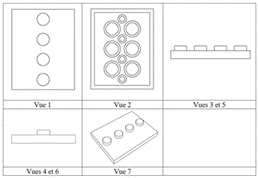Blog
Welcome to our blog.
Looking for something specific?
Enter your keywords in the searchbar below.
1 minute Martini Manna
Sound marks and distinctive character: the EU General Court upholds BVG's appeal
In an interesting ruling on sound marks the EU General Court annulled the decision of the Fifth Board of Appeal of the EUIPO, which had rejected the application for registration of EU sound mark no. 018849003 filed by the Berlin public transport company, Berliner Verkehrsbetriebe.
Chiquita Case: The Blue and Yellow Sticker Cannot Be Registered as a Trademark. The Decision of the General Court of the European Union
Can a Simple Geometric Figure Possess Distinctive Character?
This is the issue addressed in the judgment of 13 November 2024 (T-426/23) of the General Court of the European Union, which confirmed the invalidity of the trademark registered by Chiquita Brands LLC for the blue and yellow sticker attached to fresh fruit, including bananas. This judgment, the result of a long legal process, provides significant insights into the concept of distinctiveness in trademarks.
Out the Door, Back In Through the Grille: Warsaw Court Reverses Audi Advantage
At the beginning of 2024, the Court of Justice of the European Union (CJEU) issued its much-anticipated judgment in Audi (Case C-334/22), which addressed the delicate issue of trademark use on spare car parts produced by independent third parties. The decision quickly drew widespread attention across the legal community, as it was seen to mark a new milestone in the evolving jurisprudence surrounding the intersection of intellectual property rights and the automotive aftermarket. It was, arguably, the most influential trademark ruling since Ford (2015), and it triggered extensive commentary (IPKat here).
Most commentators, including me, viewed the judgment as a clear reinforcement of the legal position of original equipment manufacturers (OEMs) and many assumed it would pave the way for Audi's success in the underlying national litigation. Few could have predicted that the Polish court, which had submitted the preliminary reference, would eventually issue a ruling that ran directly counter to those expectations.
Car Manufacturers’ Trademarks and Car Parts – The CJEU Does Not Change Its Mind
EU Court of Justice rules on use of trademarks on non-OEM spare parts
The Italian Patent and Trademark Office grants reputed trademark protection to “EXCELLENCE” by Lindt
The Italian Patent and Trademark Office upheld Lindt's opposition against the registration of the ETNA EXCELLENCE trademark for chocolate and similar products, in light of Lindt's prior rights to the EXCELLENCE trademark.
The principle of trademark validation according to the EU Court of Justice: the case of the Heitech trademark
The Court of Justice has outlined the characters of the concept of "acquiescence" as expressed in Directive 2008/95 and Regulation 207/2009, with particular regard to its application following the sending of a letter of formal notice and the filing of the writ of summons.
The Italian Court of Cassation protects K-WAY’s coloured bands
The Italian Court of Cassation ruled in favour of the protection of K-Way’s “coloured stripe” figurative trademarks in proceedings against Armani
Chanel looses against Huawei: the relevant trademarks are not similar
The Court dismissed the opposition to the registration of the below Huawei’s EU figurative trademark in class 9, filed by the well-known fashion house Chanel
EUIPO erroneously declared invalid Lego’s EU design of a brick
The Court concluded that EUIPO had not ascertained that all of the features of appearance of the contested design were solely dictated by the technical function of the relevant product.
According to the EU General Court the slogan “It’s Like Milk, But Made for Humans” has a distinctive character and can be registered as a trademark
The Court stated that the slogan “It’s Like Milk, But Made for Humans” has the minimum degree of distinctive character required for it to be registered as a trademark.
The Nexthing trademark does not infringe the Next trademark, says the IP Court of Rome
The Court ruled in favour of the petitioner Nexthing Ltd which had requested an urgent declaration of non-infringement, by its homonymous word and figurative trademarks, of the NEXT (word and figurative) trademarks belonging to the defendant Next Holding SpA
EU General Court confirms that “WINDSOR – CASTLE” can be registered as a trademark
The Court endorsed the applicant’s arguments and stated that the words “WINDSOR – CASTLE” did not describe the products claimed in the application or their characteristics.












